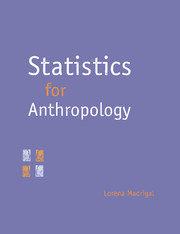Book contents
- Frontmatter
- Contents
- Preface
- 1 Introduction to statistics
- 2 Frequency distributions and graphs
- 3 Descriptive statistics: measures of central tendency and dispersion
- 4 Probability and statistics
- 5 Hypothesis testing
- 6 The difference between two means
- 7 Analysis of variance (ANOVA)
- 8 Non-parametric comparison of samples
- 9 Simple linear regression
- 10 Correlation analysis
- 11 The analysis of frequencies
- References
- Appendix A Answers to selected exercises
- Appendix B A brief overview of SAS/ASSIST
- Appendix C Statistical tables
- Index
6 - The difference between two means
Published online by Cambridge University Press: 05 June 2012
- Frontmatter
- Contents
- Preface
- 1 Introduction to statistics
- 2 Frequency distributions and graphs
- 3 Descriptive statistics: measures of central tendency and dispersion
- 4 Probability and statistics
- 5 Hypothesis testing
- 6 The difference between two means
- 7 Analysis of variance (ANOVA)
- 8 Non-parametric comparison of samples
- 9 Simple linear regression
- 10 Correlation analysis
- 11 The analysis of frequencies
- References
- Appendix A Answers to selected exercises
- Appendix B A brief overview of SAS/ASSIST
- Appendix C Statistical tables
- Index
Summary
In the last chapter we covered the topic of hypothesis testing with z and t scores. The hypothesis we tested in both cases was that a particular sample Ȳ was obtained from a population with mean µ. We discussed that we could use z scores only if we knew the population's σ (a very rare situation), and that in most cases we use a t score which is computed using the sample's standard deviation. Notice that in either case we are comparing a sample mean with a hypothetical population. This is not a very common experimental design. Instead, it is more frequent to compare two samples with each other, testing the null hypothesis that both were collected from the same population. Such hypothesis is covered here, specifically the following cases:
the difference between two independent samples (e.g. the weight of two samples of children independently collected in two different locales of a community),
the comparison of an observation with a sample (e.g. an arrowhead with a sample of arrowheads),
the comparison of two paired groups (e.g. the weight of a group of individuals before and after a smoking-cessation program).
The reader should note that, in principle, all of these tests could be done using z scores if we had knowledge of the population parameters. Since this is rarely the case, we test these hypotheses using t scores.
Information
- Type
- Chapter
- Information
- Statistics for Anthropology , pp. 96 - 112Publisher: Cambridge University PressPrint publication year: 1998
